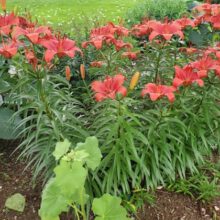Prepare Soil In The Vegetable Garden
When you start sowing and planting all kinds of delicious vegetables, preparing the soil in your vegetable garden is very important. What you should pay attention to? Here are some tips!
How to prepare soil in the vegetable garden?
A fertile soil is crumbly and airy in structure, permeable to water and contains a lot of humus and nutrients. Therefore, always use a soil improver for vegetable garden when preparing the soil. First loosen the soil well with a bio-fork or subsoiler. Digging is not necessary, with this you disturb the soil life. View the pros and cons of digging here. Also keep the acidity level, work with a soil that is too acidic (pH less than 5.5), some lime through the soil, for example grain lime. Or add some peat to the soil for a calcareous soil (pH higher 7.5). You can work in some organic fertilizer just before sowing or planting. These are gradually absorbed, so your plants make a good start.
How do I know if my vegetable garden has the correct acidity?
Are you curious if your soil has the correct acidity? Then take a soil sample of approximately 200 grams and bring it to an AVEVE store and have your soil checked. Just make sure your sample is representative of your garden. You can make a representative soil sample by taking 5 to 10 partial samples in different places in your garden. Put these partial samples in a bucket and mix them well. Spoon about 200 g of this mixture into a bag and have it analyzed in the store. You will then hear what the pH value is and you will also receive good advice on what is best for your soil. Of course you can also measure the pH yourself with a pH meter or pH soil test.
When to prepare soil?
Ideally, start planning in January-February, and prepare the soil for sowing and planting in March. Sowing under glass is possible from the end of March, but every season is different. If you like to get started quickly in the vegetable garden, consider a conservatory! Keep in mind the growing period of the sowing and planting material. Many vegetables need at least two months to grow properly. And for many vegetables, the harvest season ends in September. So you can also start a vegetable garden in the open ground in June. It is then too late for a number of spring vegetables such as peas and broad beans, but the majority of the vegetables and herbs can still be planted in the ground. Just think of pumpkins and zucchini.
Prepare the soil with green manures.
If you don’t use your vegetable garden in the autumn, you can prepare the soil in the autumn. Preferably do this with green manures. You can sow these in your garden from August to the end of October. A green manure crop is not suitable for consumption, although they sometimes appear edible. They act as a soil improver and some species introduce nitrogen into the soil. Mustard, facelia and lupine are popular green fertilizers in the garden. They bloom nicely and provide masses of useful insects, which will only benefit your vegetable garden. Read more about green fertilizers here.



